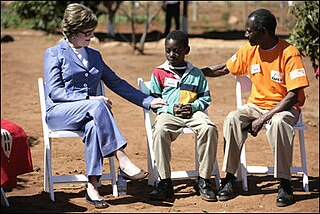
Safe sex is sexual activity using methods or devices to reduce the risk of transmitting or acquiring sexually transmitted infections (STIs), especially HIV. "Safe sex" is also sometimes referred to as safer sex or protected sex to indicate that some safe sex practices do not completely eliminate STI risks. It is also sometimes used colloquially to describe methods aimed at preventing pregnancy that may or may not also lower STI risks.

Sexual abstinence or sexual restraint is the practice of refraining from some or all aspects of sexual activity for medical, psychological, legal, social, financial, philosophical, moral, or religious reasons. Asexuality is distinct from sexual abstinence; and celibacy is sexual abstinence generally motivated by factors such as an individual's personal or religious beliefs. Sexual abstinence before marriage is required in some societies by social norms, or, in some countries, even by laws, and is considered part of chastity.

Sex education is the instruction of issues relating to human sexuality, including emotional relations and responsibilities, human sexual anatomy, sexual activity, sexual reproduction, age of consent, reproductive health, reproductive rights, safe sex, birth control and sexual abstinence. Sex education that covers all of these aspects is known as comprehensive sex education. Common avenues for sex education are parents or caregivers, formal school programs, and public health campaigns.
Friday is the day of the week between Thursday and Saturday. In countries adopting the "Monday-first" convention it is the fifth day of the week. In countries that adopt the "Sunday-first" convention, it is the sixth and penultimate day of the week. In some other countries, for example the Maldives, Friday is the first day of the weekend, with Saturday the second. In Iran Friday is the last day of the weekend, with Saturday as the first day of the working week. Bahrain, the United Arab Emirates (UAE), Saudi Arabia and Kuwait also followed this convention until they changed to a Friday–Saturday weekend: on 1 September 2006 in Bahrain and the UAE, and a year later in Kuwait. In Iran, Friday and Thursday are weekend days.

The temperance movement is a social movement against the consumption of alcoholic beverages. Participants in the movement typically criticize alcohol intoxication or promote complete abstinence from alcohol (teetotalism), and its leaders emphasize alcohol's negative effects on people's health, personalities and family lives. Typically the movement promotes alcohol education and it also demands the passage of new laws against the sale of alcohol, either regulations on the availability of alcohol, or the complete prohibition of it. During the 19th and early 20th centuries, the temperance movement became prominent in many countries, particularly in English-speaking and Scandinavian ones, and it eventually led to Prohibition in the United States which lasted from 1920 to 1933.
The Friday Fast is a Christian practice of abstaining from animal meat on Fridays, or holding a fast on Fridays, that is found most frequently in the Eastern Orthodox, Catholic, Anglican and Methodist traditions. According to Pope Peter of Alexandria, the Friday fast is done in commemoration of the crucifixion of Jesus Christ on Good Friday. Abstinence is colloquially referred to as "fasting" although it does not necessarily involve a reduction in the quantity of food.

Purity rings are worn as a sign of chastity. The practice originated in the United States in the 1990s as part of the purity movement that gave rise to Christian-affiliated sexual abstinence groups. Wearing a purity ring is typically accompanied by a religious vow to practice abstinence until marriage. Chastity rings are part of the abstinence-only sex education movement and are intended to act as a physical reminder of their chastity vow.
The Catholic Church historically observes the disciplines of fasting and abstinence at various times each year. For Catholics, fasting is the reduction of one's intake of food, while abstinence refers to refraining from meat. The Catholic Church teaches that all people are obliged by God to perform some penance for their sins, and that these acts of penance are both personal and corporeal. Bodily fasting is meaningless unless it is joined with a spiritual fast from sin. St. Basil gives the following exhortation regarding fasting:

Paenitemini is a 1966 apostolic constitution by Pope Paul VI. In Paenitemini Paul changed the strictly regulated Catholic fasting requirements. He recommended that fasting be appropriate to the local economic situation, and that all Catholics voluntarily fast and abstain. He further recommended that fasting and abstinence be replaced with prayer and works of charity "in countries where the standard of living is lower".
Contingency management (CM) is most-widely used in the field of substance abuse, often implemented as part of clinical behavior analysis. CM refers to the application of the three-term contingency, which uses stimulus control and positive reinforcement to change behavior. Patients' behaviors are rewarded ; generally, adherence to or failure to adhere to program rules and regulations or their treatment plan. CM derives from the science of applied behavior analysis (ABA), and by most evaluations, its procedures produces one of the largest effect sizes out of all mental health and educational interventions.

The Copts, who belong mostly to the Coptic Orthodox Church of Alexandria, observe fasting periods according to the Coptic calendar. These fasting periods are exceeded by no other Christian community except the Orthodox Tewahedo. Out of the 365 days of the year, Copts often fast between 180 to 210 days.

Abstinence-only sex education is a form of sex education that teaches not having sex outside of marriage. It often excludes other types of sexual and reproductive health education, such as birth control and safe sex. Comprehensive sex education, by contrast, covers the use of birth control and sexual abstinence.
Abstinence, be faithful, use a condom, also known as the ABC strategy or abstinence-plus sex education, also known as abstinence-based sex education, is a sex education policy based on a combination of "risk avoidance" and harm reduction which modifies the approach of abstinence-only sex education by including education about the value of partner reduction safe sex and birth control methods. Abstinence-only sex education is strictly to promote the sexual abstinence until marriage, and does not teach about safe sex or contraceptives. The abstinence-based sex education program is meant to stress abstinence and include information on safe sex practices. In general terms, this strategy of sex education is a compromise between abstinence-only education and comprehensive sex education. The ABC approach was developed in response to the growing epidemic of HIV/AIDS in Africa, and to prevent the spread of other sexually transmitted diseases. This approach has been credited by some with the falling numbers of those infected with AIDS in Uganda, Kenya and Zimbabwe, among others. From 1990 to 2001 the percentage of Ugandans living with AIDS fell from 15% to between 5 and 6%. This fall is believed to result from the employment of the ABC approach, especially reduction in the number of sex partners, called "Zero-Grazing" in Uganda.
The very high rate of HIV infection experienced in Uganda during the 1980s and early 1990s created an urgent need for people to know their HIV status. The only option available to them was offered by the National Blood Transfusion Service, which carries out routine HIV tests on all the blood that is donated for transfusion purposes. Because the need for testing and counseling was great, a group of local non-governmental organizations such as The AIDS Support Organisation (TASO), Uganda Red Cross, Nsambya Home Care, the National Blood Bank, the Uganda Virus Research Institute together with the Ministry of Health established the AIDS Information Centre in 1990 to provide HIV testing and counseling services with the knowledge and consent of the client involved.

Bristol Sheeran Marie Palin is an American public speaker, reality television personality, and real estate agent. She is the oldest daughter and second of five children of Todd and Sarah Palin.
Sex education in the United States is taught in two main forms: comprehensive sex education and abstinence-only. Comprehensive sex education is also called abstinence-based, abstinence-plus, abstinence-plus-risk-reduction, and sexual risk reduction sex education. This approach covers abstinence as a choice option, but also informs adolescents about human sexuality, age of consent and the availability of contraception and techniques to avoid contraction of sexually transmitted infections.

Neonatal withdrawal or neonatal abstinence syndrome (NAS) is a withdrawal syndrome of infants after birth caused by in utero exposure to drugs of dependence. There are two types of NAS: prenatal and postnatal. Prenatal NAS is caused by discontinuation of drugs taken by the pregnant mother, while postnatal NAS is caused by discontinuation of drugs directly to the infant.

Teetotalism is the practice or promotion of complete personal abstinence from alcoholic beverages. A person who practices teetotalism is called a teetotaler or is simply said to be teetotal. The teetotalism movement was first started in Preston, England, in the early 19th century. The Preston Temperance Society was founded in 1833 by Joseph Livesey, who was to become a leader of the temperance movement and the author of The Pledge: "We agree to abstain from all liquors of an intoxicating quality whether ale, porter, wine or ardent spirits, except as medicine."








